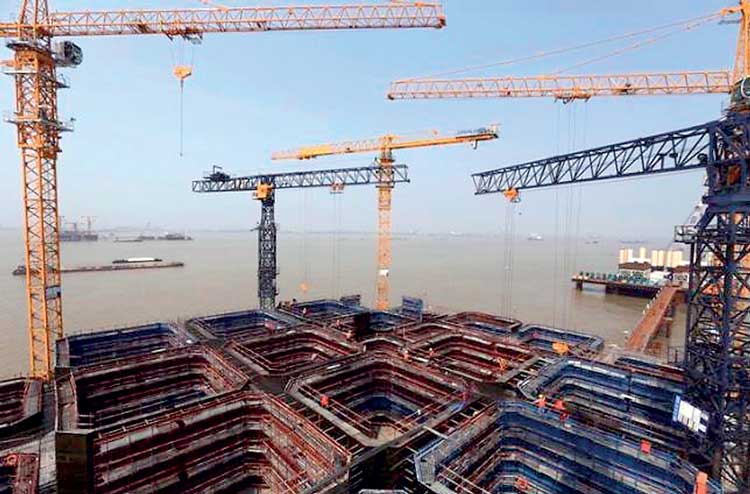Thursday Feb 19, 2026
Thursday Feb 19, 2026
Friday, 5 June 2015 00:00 - - {{hitsCtrl.values.hits}}

Cranes and workers are seen at a construction site at a main pier of the Hutong Yangtze River highway and railway bridge above the Yangtze River, in Nantong, Jiangsu province, China on April 25, 2015. Reuters
BEIJING (Reuters): China looks likely to target annual growth of about 7% in its next five-year plan so it can hit ambitious 2020 goals, raising concerns that politics could trump a commitment to disruptive reforms entailing slower but more sustainable growth.
Many economists already think 2015 growth will miss that mark – the IMF expects 6.8% followed by 6.25% in 2016 – but Beijing needs average growth of close to 7% to hit a previously declared aim of doubling gross domestic product and per capita income by 2020 from 2010.
The National Development and Reform Commission (NDRC), the country’s top planning agency, has been soliciting recommendations from think-tanks and policy advisers, which are divided into those advocating a lower growth goal of 6.5 percent for the five-year period and those recommending 7%.
“The goal of doubling GDP will be a hard constraint, which will make it difficult for the government to set a lower target,” said a researcher with the NDRC.
The leadership will discuss the country’s 13th five-year plan – a blueprint for economic and social development between 2016 and 2020 – at a party meeting in the autumn, according to sources involved in the internal policy discussions.
“A 7% target could be accepted by all sides,” said a senior economist at a top government think-tank. “It’s more of a political issue than an economic issue,” the economist said.
There have already been some signs that Beijing is open to flexing its push for reforms where they threatened growth; it put pressure on banks to help out when its preferred market solution for local government borrowing looked likely to lead to a funding crunch. It rowed back on a clampdown on opaque local government financing vehicles for the same reason and relaxed rules on phasing out some market-distorting tax breaks when their immediate withdrawal might have led to lower investment.
“Growth cannot be too low,” said an influential economist who advises the government. “Changes in the economic model and structural adjustment require a sound economic environment.”